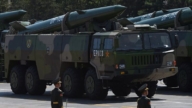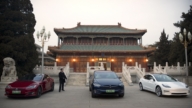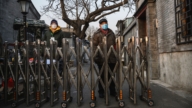【新唐人2012年6月16日訊】十八大前,大陸各省除了北京和重慶以外,其他29個省級的黨委班子換屆工作已經完成。今年已經換屆的省份中,有16個省份的專職副書記另有兼職,並且大多為重要職務,其中以「政法委書記」為主要陣地。評論人士認為,這是胡溫對血債派的一次大換血。
6月13號,新一屆湖北省黨委班子的選舉已經結束,截至目前,大陸已經有29個省級黨委班子完成換屆。在新班子中,除了新疆、西藏等少數省區外,其他還是維持了省委班子「一正兩副」的原有格局。不過,今年已經換屆的省份中,有16個省份的專職副書記另有兼職,並且大多為重要職務。
香港《大公報》報導,在這次換屆過程中,截至目前各省「政法委書記」是副書記兼職的主要陣地。廣東的朱明國、黑龍江的杜家毫、青海的王建明、浙江的李強和內蒙古的李佳五人兼任政法委書記。其中,杜家毫和朱明國是最近兼任政法委書記。
另外,近期廣東21地市在班底重組中,將以往公安局長兼任政法委書記的做法,改為「公安局長由副市長兼任」,多地「原政法委書記不再擔任省委常委」,多地文職人員轉任政法委書記。
「山東大學」教授孫文廣:「我認為它現在可能上面有一種意向,來削弱原來政法委這個權力和重要地位。」
自從前重慶公安局長王立軍出逃美領館,到薄熙來的倒臺,中共官員各種貪婪腐敗醜聞,再一次暴露在民眾的視野當中。過程中,更戲劇性的牽出「中共政法委涉及謀亂奪權」的驚天黑幕。這一事件的爆發,使中共體制內出現了前所未有的政治動盪,在國際上也引起了許多國家的關注和驚醒。
大陸民間維權律師李向陽:「因為政法委他們是統攬了公檢法,他們擾亂了中國的法制秩序,已經臭名昭著。共產黨已經喪失了民心,到下層的民眾中去問一下,沒有一個不去罵共產黨的。」
時事評論員藍述表示,中共面臨著內焦外困的情況,為了繼續求得生存,不得不作出這麼一個舉動。
藍述:「因為這個政法系統,在過去江澤民執政時期它的名聲最臭。可以說是通過政法系統去維穩,在整個維穩的過程中,對異議人士,民權團體,少數民族,整個的這個維穩機制,可以說是在中國的民眾裡面完完全全的聲名狼藉,民聲非常不好。」
藍述分析,這屬於中共內部的改革,只是在官場上看上去是減少了一些程序。
藍述:「我覺得這裡面它反映的信息可以說是兩方面的。一個是中共進入2012年以後,可以說是風雨飄搖,它遇到了全面的執政危機,所以說它必須做一定的改變,應對中國社會重重的矛盾。」
但是,藍述認為,中共所有的這些改革,由於它的本質沒有改變,沒有任何一個能夠和社會接軌的價值觀,所以中共是不可能有前途的。不過,他說,中共目前的這個改變,也不排除在中共體制裡面,有像溫家寶這一類要求改革的聲音。
因此,藍述強調,胡溫要想改革,只有拋開中國現行這個政治體制,改革才有前途。
採訪編輯/唐睿 後製/李若琳
Replacement of CCP Provincial Leadership Almost Complete, 16 Deputy Provincial Secretaries Have a Second Appointment
Besides Beijing and Chongqing, leaderships of the other 29
Chinese Communist Party’s (CCP) provincial governments have been replaced before the 18th National Congress.
Within these 29 provinces, 16 dedicated deputy secretaries
have been appointed to a second position, most of which are leader of Political and Judiciary Committee.
Commentators believe that this is a big shake up pertaining
to Hu-Wen’s replacement of the “Blood Debt Faction.”
On June 13, CCP Hubei Provincial leadership changed.
Up until now, 29 CCP provincial leaders have changed.
Out of the changed ones, except for Xinjiang and Tibet,
all the leaderships kept the former structure of one secretary and two deputy secretaries.
Within the new leaderships, 16 provincial dedicated
deputy secretaries had been named to a second position.
Most of them are key positions.
The Hong Kong “Ta Kung Pao” reported the leader of Political
and Judiciary Committee is the main second position for the deputy provincial secretary.
Zhu Mingguo from Guangdong province, Du Jiahao from
Heilongjiang province, Wang Jianming from Qinghai province,
Li Qiang from Zhejiang province and Li Jia from Inner Mongolia
province were named the secretary of Political and Judiciary Committee.
Among them, Du Jiahao and Zhu Mingguo
are new in this position.
In addition, the recent 21 CCP city leaders’ replacement
in Guangzhou Province has changed.
The police chief took the secretary of Political and Judiciary
Committee as second position, and the deputy mayor took police chief as second position.
The secretary of Political and Judiciary Committee
is taken by the non-military official, and will not be a member of the provincial standing committee.
Sun Wenguang, a professor from Shandong University:
“I think that it may be the intention of the higher leaders.
They want to weaken the power and position
of the Political and Judiciary Committee.”
Since Wang Lijun, the former Chongqing police chief, fled
to the U.S. Consulate, and then the downfall of Bo Xilai,
all kinds of greed and corrupt scandals of CCP officials
were exposed in the public.
Within the process, the most dramatic news was that,
the Political and Judiciary Committee planned to seize power.
This event initiated unprecedented political turmoil within
the CCP system, and also attracted the attention of many countries, awakening them.
Li Xiangyang, a Chinese human rights lawyer: ”The political
and Judiciary Committee controlled all public securities, prosecutions and courts.
They notoriously disrupt the legal order.
CCP has lost the people’s support.
If you ask any people from the lower class, nobody doesn’t
criticize the CCP.”
Lan Shu, a current affairs commentator said that CCP
is in dire straits both internally and externally.
To survive, it will take those kinds of changes.
Lan Shu: ”The Political and Judiciary system had
the worst repute when Jiang Zemin was the CCP leader.
CCP uses the Political and Judiciary system to maintain
stability, suppress dissidents, civil rights groups and minorities.
So, the system is infamous amongst Chinese people.
It has very a bad reputation.”
Lan Shu analyzed that the leadership change is a CCP internal
reform, which looks like cut some procedures in the official process.
Lan Shu: “I think it reflects two things: one is that we can
say the CCP is unstable in 2012. It faces an overall political crisis.
So, it must change to respond to the numerous
contradictions in China society.”
But Lan Shu thinks even with the reform, the nature of CCP
didn’t changed which means CCP doesn’t have value that can match the society.
So, CCP will not have future. However, some within CCP
internally have called for reform, like Wen Jiabao.
Lan Shu emphasized that if Hu-Wen want to reform,
the unique way is to give up the current political system. Then, China will have a future.




























